Saving honeybees Ho’ola rescues scores of hives
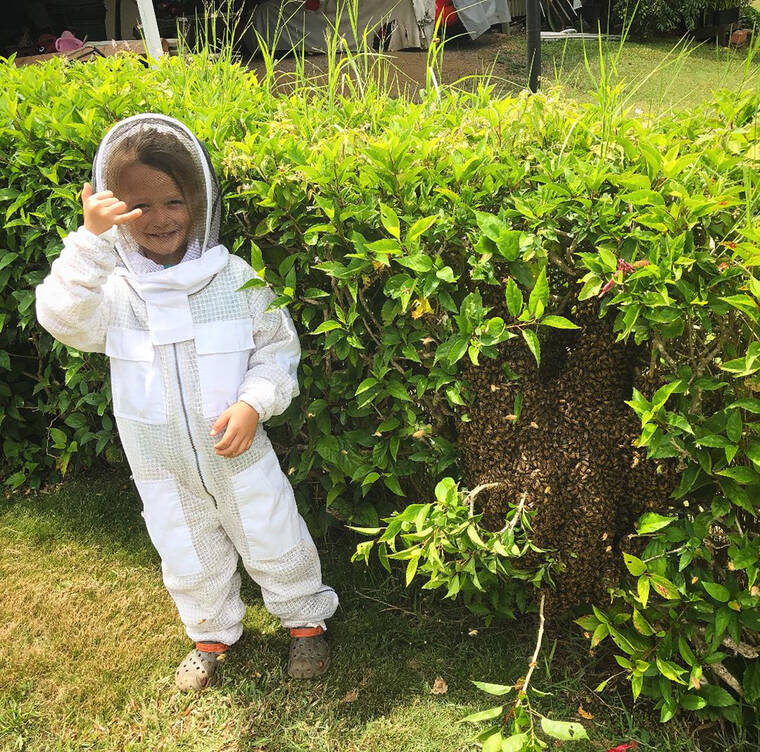
At 6 years old, Lukana has been on many hive removals and can actually do some of the work himself at this point. (Pekuna Hong/Special to West Hawaii Today)
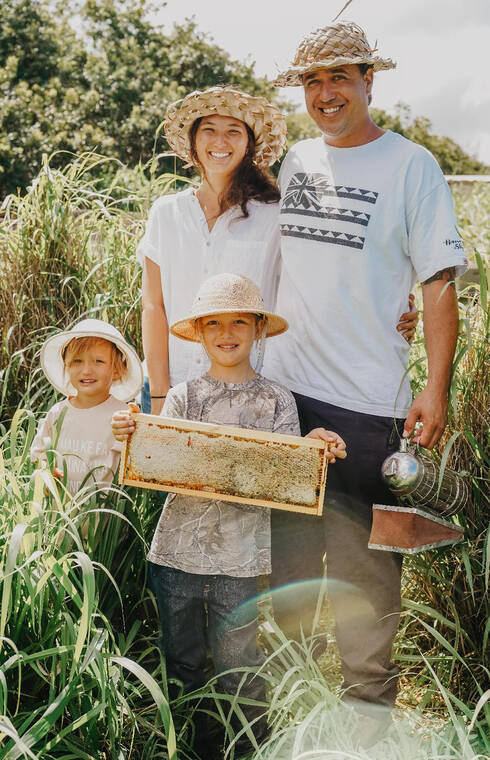
Kailin, Kai, Lukana and Nake’u all participate in the family bee business, Ho’ola. (Pekuna Hong/Special to West Hawaii Today)
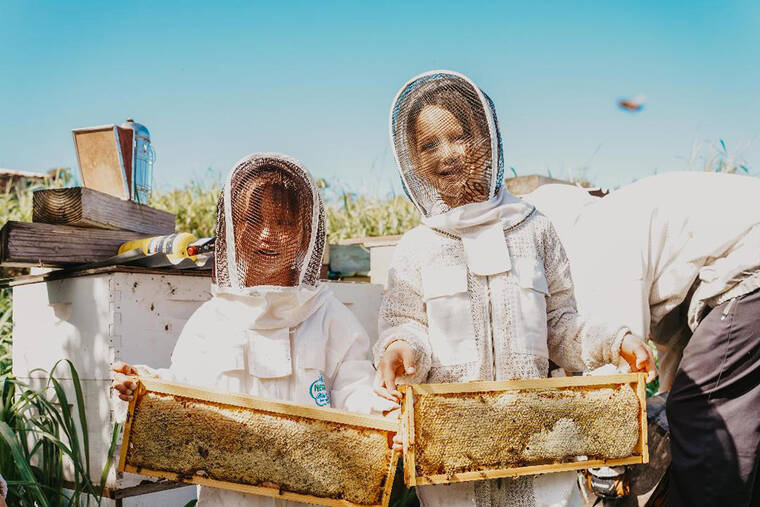
Lukana and Nake’u are beekeepers in training and often help with saving and maintaining hives. (Pekuna Hong/Special to West Hawaii Today)
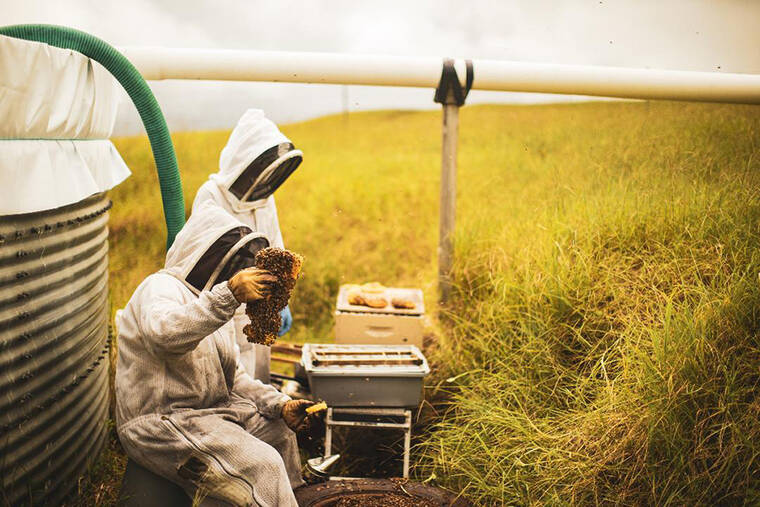
Saving a hive involves many steps to ensure that the colony will accept their new home. (Perrin Jones/Special to West Hawaii Today)
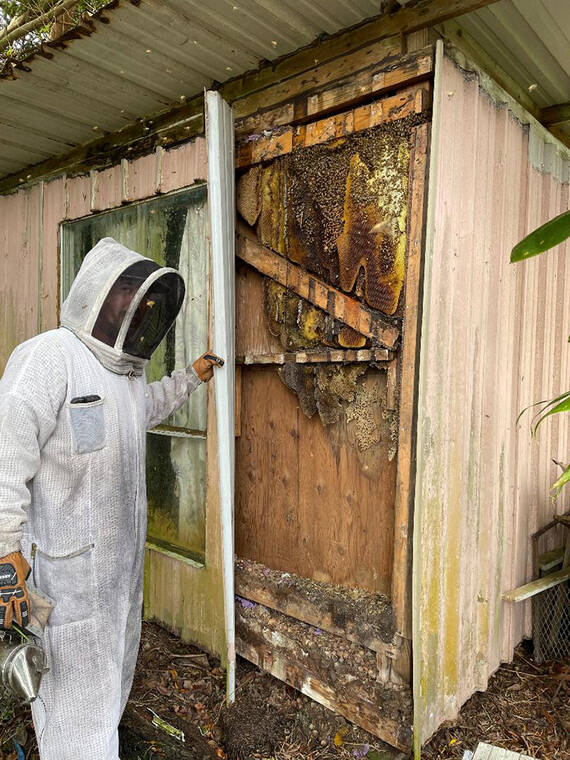
Removing bee hives can be challenging when the bees are living inside walls. (Kailin Kim/Special to West Hawaii Today)
Ho’ola means to heal and that is the name that Kailin and Kai chose for their business when they started rescuing bees. In the last six years, they have rescued nearly 150 bee colonies. Many have been placed on properties in Kohala as pollinators. They are currently maintaining about 50 hives on their farm in Kapa’au. The pair are highly motivated to heal the colonies they rescue and help the bees to thrive. They consider their work a valuable service to their community.
Ho’ola means to heal and that is the name that Kailin and Kai chose for their business when they started rescuing bees. In the last six years, they have rescued nearly 150 bee colonies. Many have been placed on properties in Kohala as pollinators. They are currently maintaining about 50 hives on their farm in Kapa’au. The pair are highly motivated to heal the colonies they rescue and help the bees to thrive. They consider their work a valuable service to their community.
We all know that bees are important pollinators of our food crops, but they are also an important part of our ecosystem. As that, they need to be saved, nurtured and protected. Thankfully, Kai and Kailin are on it.
I found Ho’ola listed in the Women Farmer’s Network and was delighted to meet Kailin Kim and hear her story. She grew up on Oahu but moved to Hilo to pursue her degree at the University of Hawaii in Hawaiian studies and agriculture. Beekeeping was one of the electives offered in the ag program. She took it thinking it might be interesting and found it both fascinating and compelling.
Her partner Kai Hudgins grew up in Waimea. They were both helping out on Kai’s dad’s farm when Kailin realized putting pollinators in place might increase his avocado crop. Bingo…she quickly connected the dots and set him up with bees.
A few years later, she and Kai found a wild hive in a water meter box at a neighbor’s house. The hive had to be moved and they decided to try it.
“It was a steep learning experience,” Kailin recalls, “But it felt great to help our neighbors while also helping the bees.”
They re-hived the bees and started working with them to improve the health of the hive. The experience added a lot of information to what Kailin had learned in class and really launched the pair’s deep dedication to bees. That was in 2016.
Today, the couple gets calls from people around the island who need to move bees off their property. Sometimes they need to remove a swarm of bees that have settled in a place to rest. These are the easier calls. In fact, their 6-year-old son Lukana is often a big help in hiving a swarm. He has been traveling with his parents to rescue operations since he was 2 and now, he has the process down.
Though Kailin does not recommend parents take inexperienced children on bee rescues, her 3-year-old son Nake’u often goes with them now and will likely become another bee rescuer early in life.
When they get a call for a swarm rescue, they take one of their Langstroth upright stackable hives and gently move the swarm into the hive. They have become experienced at finding the queen and placing her in the hive to help the bees stay in their new home. Once the whole colony has settled in, they will move the hive to pre-determined apiary locations, usually in Kohala.
When I asked why they use the Langstroth hives, Kailin was quick to respond that they are just easier to move. The hive’s portability makes rescue operations much easier.
Removing unwanted hives that are established can sometimes be challenging. Bees often set up hives in places that are difficult to access. Inside homes, churches, barns and sheds, bees can get into spaces between exterior and interior walls and have combs full of honey as well as cells for raising their young in place.
Since removing walls can be part of the procedure, careful use of demolition tools is required. Complete reconstruction is also important to make sure bees don’t return to the site. Kai and Kailin’s years of experience mean they can now do careful and complete removals, including repairs, more easily while maintaining high safety standards.
Although they started with a mission to save the bees, their work has expanded beyond saving the colonies into actually establishing them into healthy hives. Their mission is well-expressed in their email address savehealthrive@gmail.com.
For Kailin and Kai the hive-healing process is as organic and sustainable as they can make it. They not only avoid using chemicals to keep the hives pest free but they also eschew the use of plastic foundations in the hives. This allows the bees to build their own combs as they see fit.
To round out their dedication to a chemical free and sustainable life style, they grow crops and raise other animals on the farm using organic practices. Overall, they strive to promote responsible and sustainable practices wherever they can, offering a positive example to their community.
Kailin says, “We are deeply interested in promoting the wellbeing of our environment, our plants, our families, our community and future generations.” Their beekeeping operation and their farm is indicative of that dedication.
Kai is equally dedicated to this mission. He finds working with bees to be the most satisfying work he has ever done and sees it as an investment in the future for his family as well as the community.
Most of what this energetic couple does is teach by example based on what they have learned from experience.
Toward the end of our visit, Kailin quoted a Hawaiian proverb that summarizes her continuing dedication to learning best practices through a variety of experiences, ʻAʻohe pau ka ʻike i ka hālau hoʻokahi. She then said it translates to “All knowledge is not taught in the same school.”
She and her family are getting daily lessons as they set about creating a safe, clean and healthy life for themselves and their community through their experiences on their farm and with their bees.
To learn more about the Ho’ola family, their products and their services, check out their website at savehealthrive.com or connect with them on Facebook and Instagram @ho.olahone. You can also get in touch with them by phone at (808) 386-9886 or by email at savehealthive@gmail.com.
Diana Duff is a plant adviser, educator and consultant living part time in Kailua-Kona.
Gardening Events
Every Saturday: “Work Day at Amy Greenwell Garden” from 9 a.m. to 12:30 p.m. Meet at the Garden Visitor Center across from the Manago Hotel in Captain Cook. Come with a mask and be prepared to practice social distancing. Volunteers can help with garden maintenance and are invited to bring a brown baglunch. Water and snacks provided. Call Peter at (808) 323-3318 for more information.
Jan. 26: “Virtual Invasive Pest Mini-Conference” from 9:30 a.m. to noon via Zoom at https://bit.ly/3yVZtW4 covering parasitic wasps, avocado lace bug, coffee leaf rust, and more.
Available online: “Hawaii Coffee Association Talk Story Webinar” recorded in 2021. Discussion of coffee industry priorities with an emphasis on coffee leaf rust at https://youtu.be/1lJyYPOger4.
Farmer Direct Markets
Wednesday: “Ho‘oulu Farmers Market” at Sheraton Kona Resort and Spa at Keauhou Bay
Saturday: “Keauhou Farmers Market” 8 a.m. to noon at Keauhou Shopping Center. Information on their online market: keauhoufarmersmarket.com/onlinemarket
“Kamuela Farmer’s Market” 7:30 a.m. to noon at Pukalani Stables
“Waimea Town Market” 7:30 a.m. to noon at the Parker School in Waimea
“Waimea Homestead Farmers Market” from 7:30 a.m. to noon at the Waimea middle and elementary school playground
Sunday: “Pure Kona Green Market” 9 a.m. to 2 p.m. at Amy Greenwell Garden in Captain Cook
“Hamakua Harvest” 9 a.m. to 2 p.m. at Highway 19 and Mamane Street in Honoka’a
Plant Advice Lines
Anytime: konamg@ctahr.hawaii.edu; Tuesdays and Thursdays from 9 a.m. to noon at UH-CES in Kainaliu at (808) 322-4893.


